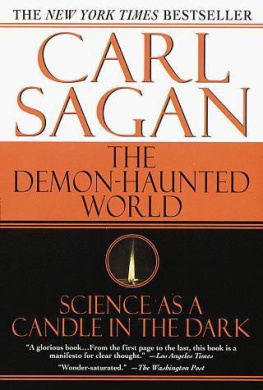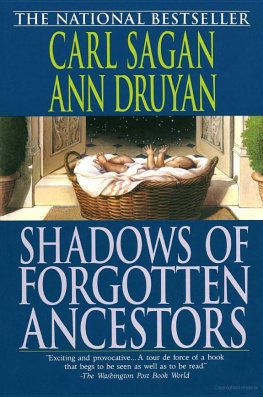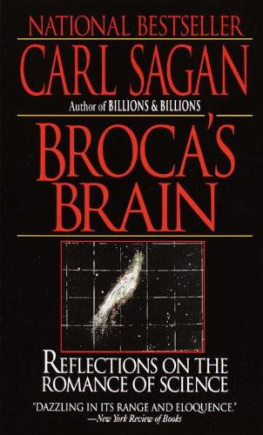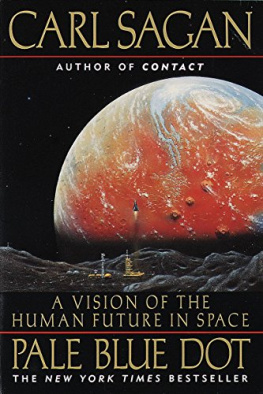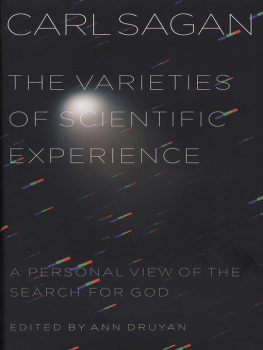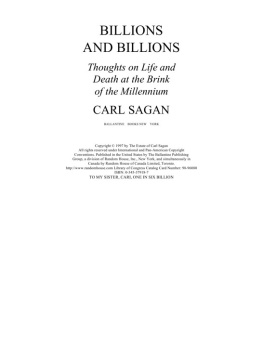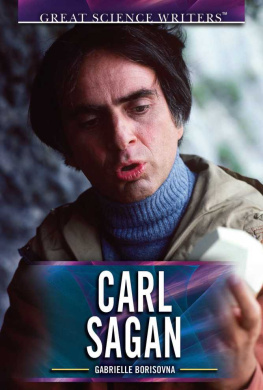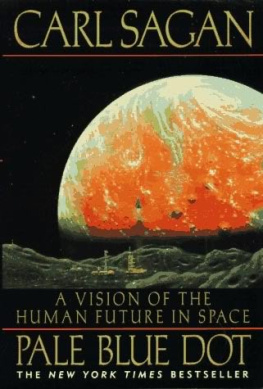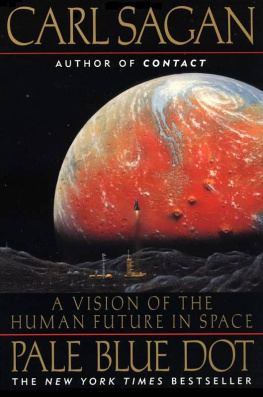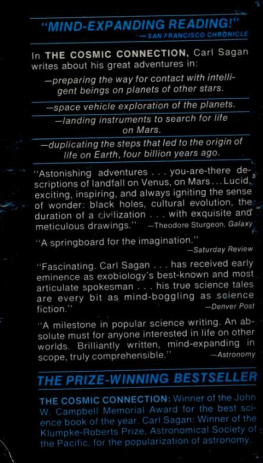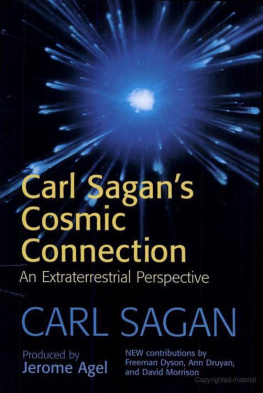Carl Sagan - Broca's Brain: The Romance of Science
Here you can read online Carl Sagan - Broca's Brain: The Romance of Science full text of the book (entire story) in english for free. Download pdf and epub, get meaning, cover and reviews about this ebook. genre: Science. Description of the work, (preface) as well as reviews are available. Best literature library LitArk.com created for fans of good reading and offers a wide selection of genres:
Romance novel
Science fiction
Adventure
Detective
Science
History
Home and family
Prose
Art
Politics
Computer
Non-fiction
Religion
Business
Children
Humor
Choose a favorite category and find really read worthwhile books. Enjoy immersion in the world of imagination, feel the emotions of the characters or learn something new for yourself, make an fascinating discovery.

- Book:Broca's Brain: The Romance of Science
- Author:
- Genre:
- Rating:5 / 5
- Favourites:Add to favourites
- Your mark:
- 100
- 1
- 2
- 3
- 4
- 5
Broca's Brain: The Romance of Science: summary, description and annotation
We offer to read an annotation, description, summary or preface (depends on what the author of the book "Broca's Brain: The Romance of Science" wrote himself). If you haven't found the necessary information about the book — write in the comments, we will try to find it.
Carl Sagan: author's other books
Who wrote Broca's Brain: The Romance of Science? Find out the surname, the name of the author of the book and a list of all author's works by series.
Broca's Brain: The Romance of Science — read online for free the complete book (whole text) full work
Below is the text of the book, divided by pages. System saving the place of the last page read, allows you to conveniently read the book "Broca's Brain: The Romance of Science" online for free, without having to search again every time where you left off. Put a bookmark, and you can go to the page where you finished reading at any time.
Font size:
Interval:
Bookmark:

Carl Sagan
Broca's Brain: The Romance of Science
1979
To Rachel and Samuel Sagan, my parents,
who introduced me to the joys of understanding
the world, with gratitude and admiration and love
ACKNOWLEDGMENTS
FOR DISCUSSION on specific points I am grateful to a number of friends, correspondents and colleagues, including Diane Ackerman, D. W. G. Arthur, James Bakalar, Richard Berendzen, Norman Bloom, C. Chandrasekhar, Clark Chapman, Sidney Coleman, Yves Coppens, Judy-Lynn Del Rey, Frank Drake, Stuart Edelstein, Paul Fox, D. Carleton Gajdusek, Owen Gingerich, Thomas Gold, J. Richard Gott III, Steven J. Gould, Lester Grinspoon, Stanislav Grof, J. U. Gunter, Robert Horvitz, James W. Kalat, B. Gentry Lee, Jack Lewis, Marvin Minsky, David Morrison, Philip Morrison, Bruce Murray, Phileo Nash, Tobias Owen, James Pollack, James Randi, E. E. Salpeter, Stuart Shapiro, Gunther Stent, O. B. Toon, Joseph Veverka, E. A. Whitaker and A. Thomas Young.
This book owes much, in all stages of production, to the dedicated and competent efforts of Susan Lang, Carol Lane, and, particularly, my executive assistant, Shirley Arden.
I am especially grateful to Ann Druyan and Steven Soter for generous encouragement and stimulating commentary on a great many of the subjects of this book. Ann has made essential contributions to most chapters and to the title; my debt to her is very great.
INTRODUCTION
WE LIVE in an extraordinary age. These are times of stunning changes in social organization, economic wellbeing, moral and ethical precepts, philosophical and religious perspectives, and human self-knowledge, as well as in our understanding of that vast universe in which we are imbedded like a grain of sand in a cosmic ocean. As long as there have been human beings, we have posed the deep and fundamental questions, which evoke wonder and stir us into at least a tentative and trembling awareness, questions on the origins of consciousness; life on our planet; the beginnings of the Earth; the formation of the Sun; the possibility of intelligent beings somewhere up there in the depths of the sky; as well as, the grandest inquiry of all-on the advent, nature and ultimate destiny of the universe. For all but the last instant of human history these issues have been the exclusive province of philosophers and poets, shamans and theologians. The diverse and mutually contradictory answers offered demonstrate that few of the proposed solutions have been correct. But today, as a result of knowledge painfully extracted from nature, through generations of careful thinking, observing and experimenting, we are on the verge of glimpsing at least preliminary answers to many of these questions.
There are a number of themes that weave through the structure of this book, appearing early, disappearing for a few chapters, and then resurfacing in a somewhat different context-including the joys and social consequences of the scientific endeavor; borderline or pop science; the not entirely different subject of religious doctrine; the exploration of the planets and the search for extraterrestrial life; and Albert Einstein, in the centenary of whose birth this book is published. Most of the chapters can be read independently, but the ideas have been presented in an order chosen with some care. As in some of my previous books, I have not hesitated to interject social, political or historical remarks where I thought they might be appropriate. The attention given to borderline science may seem curious to some readers. Practitioners of pop science were once called Paradoxers, a quaint nineteenth-century word used to describe those who invent elaborate and undemonstrated explanations for what science has understood rather well in simpler terms. We are today awash with Paradoxers. The usual practice of scientists is to ignore them, hoping they will go away. I thought it might be useful-or at least interesting-to examine the contentions and conceits of some Paradoxers a little more closely, and to connect and contrast their doctrines with other belief systems, both scientific and religious.
Both borderline science and many religions are motivated in part by a serious concern about the nature of the universe and our role in it, and for this reason merit our consideration and regard. In addition, I think it possible that many religions involve at their cores an attempt to come to grips with profound mysteries of our individual life histories, as described in the last chapter. But both in borderline science and in organized religion there is much that is specious or dangerous. While the practitioners of such doctrines often wish there were no criticisms to which they are expected to reply, skeptical scrutiny is the means, in both science and religion, by which deep insights can be winnowed from deep nonsense. I hope my critical remarks in these pages will be recognized as constructive in intent. The well-meaning contention that all ideas have equal merit seems to me little different from the disastrous contention that no ideas have any merit.
This book, then, is about the exploration of the universe and ourselves; that is, it is about science. The range of topics may seem very diverse-from a crystal of salt to the structure of the cosmos, myth and legend, birth and death, robots and climates, the exploration of the planets, the nature of intelligence, the search for life beyond the Earth. But, as I hope will emerge, these topics are connected because the world is connected, and also because human beings perceive the world through similar sense organs and brains and experiences that may not reflect the external realities with absolute fidelity.
Each chapter of Brocas Brain is written for a general audience. In a few places-such as Venus and Dr. Velikovsky, Norman Bloom, Messenger of God, Experiments in Space and The Past and Future of American Astronomy-I have included an occasional technical detail; but understanding such details is not necessary for understanding the overall flow of the discussion.
Some of the ideas in Chapters 1 and 25 were first presented in my William Menninger Memorial Lecture to the American Psychiatric Association in Atlanta, Georgia, in May 1978. Chapter 16 is based on a banquet address at the annual meeting of the National Space Club, Washington, D.C., April 1977; Chapter 18 on an address at a symposium, commemorating the first liquid-fuel rocket flight, held at the Smithsonian Institution, Washington, D.C., March 1976; Chapter 23 on a sermon delivered at the Sage Chapel Convocation, Cornell University, November 1977; and Chapter 7 on a talk at the annual meeting of the American Association for the Advancement of Science, February 1974.
This book is written just before-at most, I believe, a few years or a few decades before-the answers to many of those vexing and awesome questions on origins and fates are pried loose from the cosmos. If we do not destroy ourselves, most of us will be around for the answers. Had we been born fifty years earlier, we could have wondered, pondered, speculated about these issues, but we could have done nothing about them. Had we been born fifty years later, the answers would, I think, already have been in. Our children will have been taught the answers before most of them will have had an opportunity even to formulate the questions. By far the most exciting, satisfying and exhilarating time to be alive is the time in which we pass from ignorance to knowledge on these fundamental issues; the age where we begin in wonder and end in understanding. In all of the four-billion-year history of life on our planet, in all of the four-million-year history of the human family, there is only one generation privileged to live through that unique transitional moment: that generation is ours.
Next pageFont size:
Interval:
Bookmark:
Similar books «Broca's Brain: The Romance of Science»
Look at similar books to Broca's Brain: The Romance of Science. We have selected literature similar in name and meaning in the hope of providing readers with more options to find new, interesting, not yet read works.
Discussion, reviews of the book Broca's Brain: The Romance of Science and just readers' own opinions. Leave your comments, write what you think about the work, its meaning or the main characters. Specify what exactly you liked and what you didn't like, and why you think so.

